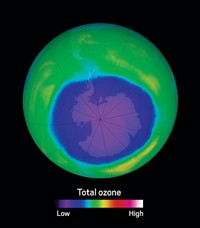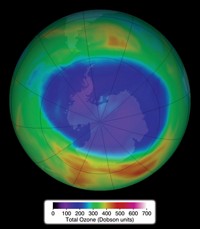Advertisement
Grab your lab coat. Let's get started
Welcome!
Welcome!
Create an account below to get 6 C&EN articles per month, receive newsletters and more - all free.
It seems this is your first time logging in online. Please enter the following information to continue.
As an ACS member you automatically get access to this site. All we need is few more details to create your reading experience.
Not you? Sign in with a different account.
Not you? Sign in with a different account.
ERROR 1
ERROR 1
ERROR 2
ERROR 2
ERROR 2
ERROR 2
ERROR 2
Password and Confirm password must match.
If you have an ACS member number, please enter it here so we can link this account to your membership. (optional)
ERROR 2
ACS values your privacy. By submitting your information, you are gaining access to C&EN and subscribing to our weekly newsletter. We use the information you provide to make your reading experience better, and we will never sell your data to third party members.
Environment
No Longer Thinning, O3 may Have Improved at Midlatitudes
by Bette Hileman
September 5, 2005
| A version of this story appeared in
Volume 83, Issue 36
OZONE DEPLETION
The stratospheric ozone layer is no longer declining and may actually be improving in midlatitude areas, says a study published in the Journal of Geophysical Research (2005, 110, D16306).
Analysis of several different satellite and surface-monitoring records indicates that in some parts of the world, the thickness of the ozone layer has increased a small amount in the past few years. Scientists at the National Oceanic & Atmospheric Administration and four universities did the analysis.
"The observed changes may be evidence of ozone improvement in the atmosphere," says Elizabeth (Betsy) Weatherhead, a coauthor of the study who is an atmospheric physicist at the Cooperative Institute for Research in Environmental Sciences, a joint institute of NOAA and the University of Colorado, Boulder.
The study shows that the Montreal protocol, set up in 1987 to limit the production and use of ozone-depleting chemicals, is probably working. Between 1996 and 2002, the depletion of the ozone layer began to level off at latitudes higher than 40° in both hemispheres.
Changes in atmospheric circulation patterns could not explain the improvement in ozone, the authors write. It will likely take 20 to 70 years for ozone to return to normal levels because some ozone-depleting chemicals stay in the stratosphere for decades, Weatherhead says. The recovery seen so far represents "a successful collaboration between chemical manufacturers, scientists, and policymakers," she says.






Join the conversation
Contact the reporter
Submit a Letter to the Editor for publication
Engage with us on Twitter